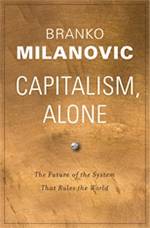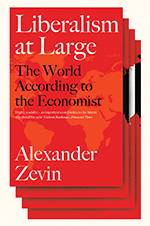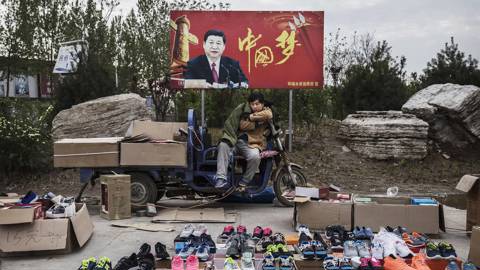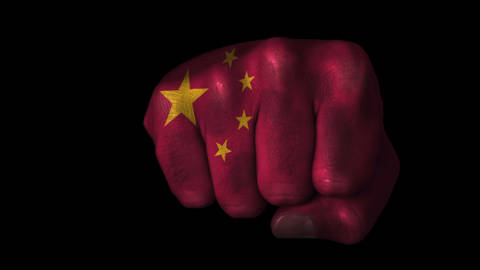Harold James
Says More…
This week, Project Syndicate catches up with Harold James, Professor of History and International Affairs at Princeton University and a senior fellow at the Center for International Governance Innovation.
Project Syndicate: The UK Supreme Court’s ruling that Prime Minister Boris Johnson’s suspension of Parliament was unlawful seems to give you hope that “genuine conservativism” is “poised to stage a comeback against the nihilistic imposters who have been acting in its name.” Yet Johnson seems determined to purge the Conservative Party of all members who do not support the populist Brexit revolution. Without a political party to call their own, how could “true conservatives” stage a comeback?
Harold James: Politics are being recast in almost every industrial country (with Japan as the only obvious exception). In Italy, the Christian Democrats collapsed in the early 1990s. In France, the old two-party system, comprising center-right and center-left forces, was upended in the 2017 presidential election. And in the United Kingdom, Brexit has caused deep political fragmentation, particularly in the Conservative Party.
French President Emmanuel Macron, who created his party La République En Marche ! shortly before the 2017 election, offers the best modern example of how politics can be remade in the twenty-first century. It would have been impossible to predict the party’s emergence even in late 2016.
In the UK, the first-past-the-post electoral system makes launching such a political movement much more difficult. But that does not mean it is impossible for new parties to emerge, let alone for old parties to be reenergized and transformed. The Liberal Democrats, for example, now stand as a beacon of hope and rationality.
If voters learn to make tactical coalitions within individual parliamentary constituencies, the Liberal Democrats could potentially stand in the tradition of the nineteenth-century Whigs or Liberals – a movement that, paradoxically, represented the “true conservatism” of cautious reform and incremental change. Its worldview was memorably depicted in Anthony Trollope’s political novels of the Victorian era.
In those novels, Trollope describes Plantagenet Palliser – a reluctant, painfully shy, and highly self-conscious politician, with a strong sense of patriotism and a deep-seated affinity for public duty. According to Palliser, “what we all desire is to improve the condition of the people by whom we are employed, and to advance our country, or at any rate, to save it from retrogression.” He adds that “the idea that political virtue is all on one side is both mischievous and absurd.”
“Planty Pall” has an enduring appeal. In the 1970s – when the UK was roiled by another constitutional crisis, though not as acute as the current one – a BBC television series based on the Palliser novels helped to fuel a significant rise in the Liberal Party’s opinion poll ratings and even election performance. It helped that the actor portraying Palliser resembled the Liberal leader, Jeremy Thorpe.

Subscribe to PS Digital
Access every new PS commentary, our entire On Point suite of subscriber-exclusive content – including Longer Reads, Insider Interviews, Big Picture/Big Question, and Say More – and the full PS archive.
Planty Pall’s attractiveness is rooted not in charisma, but in competence – a quality that is sorely lacking in many countries’ political establishments today. With competent political leadership – underpinned by a holistic vision of “one nation,” instead of a polarizing competition between opposing political tribes – the UK’s situation would prove not to be hopeless.
PS: Likewise, while you argue that Brexit and US President Donald Trump have destroyed traditional conservatism “in remarkably similar ways,” you view the impeachment inquiry launched against Trump as a possible turning point. But, with some 80-90% of the GOP’s base firmly behind Trump, very few congressional Republicans are willing to criticize him. On the contrary, they have supported his radical vision on matters like taxation and the need to appoint ideologically “pure” judges. Why should anyone believe that will change?
HJ: Many political commentators have been surprised by the extent to which support for Trump, as measured in opinion polls, has held up. The surprise is not that he is causing long-term damage to both US and international institutions; he was elected on the promise of doing just that.
But perceptions more broadly have often favored Trump. When he took over the presidency, the US was in the later phases of a long economic recovery. His initial tax measures delivered a short-term stimulus (while posing a longer-term threat to fiscal sustainability), and even the trade war appeared to many like an appropriately tough strategy for pushing China to make concessions regarding the protection of foreign intellectual property. Some of the trade war’s domestic losers even reported that they were willing to pay a small price for the national good.
We are, however, nearing a tipping point. Trump’s sudden withdrawal of US troops from Syria is already having disastrous consequences. The impeachment inquiry is gathering momentum, as revelations about Trump, his lawyer Rudy Giuliani, and their associates in Ukraine multiply. And consumers may be badly hit by the planned December 15 tariff increases (just in time for Christmas!). In this context, it is hard to believe that public sentiment will not soon turn against Trump.
Trump has bulldozed the old Republican Party. In his wake, the Republicans will need to rebuild from the ground up, developing an all-encompassing new framework for a center-right movement that considers both social policy and financial responsibility. Such a movement would aim to foster a system in which social arrangements (most fundamentally, the family unit, though not necessarily conventionally conceived) make its members stronger, more energetic, and more engaged participants in broader communities.
A very important series of books and studies (including a new book by Branko Milanović, which I recommend below) have shown that in advanced modern societies, inequality is driven partly by marriage preferences and social bonding among the “elites,” who pass on non-pecuniary advantages in education. The logical conclusion is that functioning families should not be a privilege reserved for an educated upper class. That is the path to social collapse – a path along which we are well advanced.
PS: You take a more positive view than many toward Facebook’s plans to launch its own digital currency, Libra. “Were an alternative currency based on multiple assets broadly adopted,” you wrote, “it would not be as destabilizing as its critics claim.” How would you balance the concerns of critics – related, for example, to how a private entity would handle a global run on the currency it issues – with the benefits of a “truly universal currency”?
HJ: Issuing a currency on the promise of convertibility into a set of other currencies raises obvious regulatory issues. And, indeed, such initiatives triggered a good deal of skepticism in the past. In the 1980s, when Europeans pushed for a private European Currency Unit, they had only limited success. The International Monetary Fund has always resisted the idea of widespread private use of its reserve asset, the Special Drawing Right.
But, in Libra’s case, asset-backing becomes an issue only if the currency is used for banking operations or maturity transformations. If it is used purely for payments, it is no more or less problematic than existing currencies. In short, the regulatory problem lies in banking operations, not in the payments system.
Here, it is important to draw on historical experience. Before the nineteenth century, a large share of economic interactions involved multiple competing currencies. Before the pocket calculator or the PC, that obviously created enormous calculation challenges. In the age of mobile Internet, however, there is no reason why different currencies cannot be used for different sorts of economic activity.
And, in fact, “dollarization” is already widespread, with transactions carried out in a major trading area’s currency – not only US dollars, but also renminbi or euros. When it comes to pricing goods or services, there are many reasons why currency baskets might be preferable. Moreover, it is likely that new and different sorts of currencies will emerge.
Of course, new currencies raise some potential issues – most notably, as in the case of Libra, that controlling the means of exchange is a way to access commercially or politically valuable payments information. But that concern also applies in the case of state-organized payment systems. If platforms like Facebook want to encourage users to surrender their privacy, they might consider incentive schemes. Other platforms, with more privacy guarantees, would then provide fewer paybacks or bonuses.
Residents of small countries with problematic governance structures are most likely to lead the way in adopting one – and probably more – of the many digital and alternative currencies. That competition will pose a real threat to monetary authorities and central banks everywhere. But the solution is not to try to ban or hamper the alternative currencies, just as it didn’t do any good when some countries required a human to walk in front of a new-fangled automobile carrying a warning flag.
PS: Inspired by China’s Belt and Road Initiative, Europe, you have argued, would do well to improve physical integration, establishing connections and channeling investment to “areas that have been ignored and impoverished for too long.” Given deep-seated opposition, especially among northern European Union member states, to anything that smacks of fiscal transfers, is the EU really equipped to launch a BRI of its own?
HJ: That opposition is, indeed, a major challenge facing Europe. But there are many areas where coordinated European-level action is a much more efficient and cost-effective solution – or even the only solution. Security policy is a case in point.
The issue of “Europeanizing” key policy areas will become increasingly prominent, as debate about a coordinated response to the climate crisis intensifies. Linking up national energy markets will remain an important – and challenging – imperative. Europe has made signification progress on gas, with pipelines that can reverse flows making it harder for one big energy supplier to blackmail buyers.
But the use of renewables – particularly solar – will require the transfer of large amounts of electricity from the Mediterranean to northern Europe, and thus much larger-capacity lines. The construction of such lines has always been controversial: even a modest north-south link in Germany has been hampered by local opposition to high-voltage power lines. So, if Europe is going to implement any kind of Green New Deal – which, to be sure, can work only at the European level – an inclusive debate will be crucial.
BY THE WAY . . .
PS: You have described digital technologies as possible solutions to multiple governance challenges, from ending trade and currency wars to, theoretically, making “popular sovereignty” work. Are there other long-standing governance problems that you think digital technologies could resolve in the relatively near term?
HJ: In many areas – such as health or the environment – people make better decisions when they know more. Referenda that pose big and unclear questions are disastrous, with the Brexit referendum now established as a canonical example. But digital technologies can enable countries to make better choices about specific actions, such as the extent of investment in rail or energy links, and how these should be financed (taxes or user fees).
PS: As a historian, do you believe there is an era, event, or trend that policymakers should take extra care to understand?
HJ: Throughout my career as a historian, I’ve often returned to the Great Depression – the seminal catastrophe of the twentieth century (along with World War I, of which the Depression was partly an aftershock). The Great Depression effectively destroyed democracy, the market economy, and the international order, as it encouraged a view of domestic and international politics as a zero-sum game.
It is chilling how much of the radical political rhetoric – and, indeed, logic – of the interwar period can be heard today, even though the 2008 global economic crisis was much milder than the Great Depression. For example, the Financial Times commentator Martin Wolf recently drew a parallel between the logic of British Prime Minister Boris Johnson and the Nazi propagandist Joseph Goebbels. “The modern structure of the German State,” Goebbels stated in 1933, “is a higher form of democracy in which, by virtue of the people’s mandate, the government is exercised authoritatively, while there is no possibility for parliamentary interference, to obliterate and render ineffective the execution of the nation’s will.”
Today’s politicians have even echoed Adolf Hitler himself. On November 10, 1933, speaking to workers in Berlin, Hitler denounced – without using the word “Jews” – a small rootless international “clique” of “people who are at home both nowhere and everywhere, who do not have anywhere a soil on which they have grown up, but who live in Berlin today, in Brussels tomorrow, Paris the day after that, and then again in Prague or Vienna or London.”
These people, Hitler continued, as a man in the crowd shouted “Jews,” are “the only ones who can really be described as international elements, because they can do business everywhere. The people, however, cannot follow them, because the people are linked to their home, to their soil, to the possibilities of their state, their nation.”
That speech was perhaps deliberately recast by a modern leader of Germany’s far-right Alternative für Deutschland, Alexander Gauland, last year. More terrifying, it was unintentionally echoed by an undeniably decent and civilized politician: Johnson’s predecessor, Theresa May. In her first Conservative conference speech as prime minister, May said, “Today, too many people in positions of power behave as though they have more in common with international elites than with the people down the road, the people they employ, the people they pass in the street. But if you believe you’re a citizen of the world, you’re a citizen of nowhere. You don’t understand what the very word ‘citizenship’ means.” For a world facing shared challenges, the revival of such poisonous rhetoric and zero-sum thinking is catastrophic. Not only will it fail to strengthen communities; it will weaken them.
PS: “History is bunk,” Henry Ford famously said. Nowadays, it seems that many colleges and universities agree, and are shifting budgetary resources accordingly. Are they wrong to focus on the more technical subjects that today’s labor market demands? What purposes does studying history serve?
HJ: I do think history should be taught in schools and universities. It is, after all, a tremendous experimental field, which reveals which strategies and tactics have succeeded and which have failed, sometimes quite disastrously. But, for the field to serve its purpose, historians must resist being pushed in two professionally tempting directions: toward pointillism, which can distort the subject until it becomes practically irrelevant, or toward propaganda, with historians citing the past to advance polemics about the present.
After the fall of the Soviet Union, Francis Fukuyama declared that we had reached the “end of history.” But, in the twenty-first century, history bit back. Momentous events – such as the September 11, 2001, terrorist attacks in the US and the country’s ensuing “War on Terror,” as well as the global financial crisis – turned some historians into pundits, sometimes with damaging consequences. A number of prominent British historians contributed to the Brexit vote, by spreading fallacious notions about the centrality of sovereignty to the British constitutional tradition. It is both limiting and misguided to compare the UK’s departure from the EU to Henry VIII’s declaration of sovereignty in opposition to the Roman pontiff.
PS: On a related but more personal note, if you had not become a historian, what career might you have pursued?
HJ: I love language. I love stories. I love literature. If I hadn’t been a historian, I would have loved to have been an actor – one with a permanent engagement with Shakespeare.
James recommends
We ask all our Say More contributors to tell our readers about a few books that have impressed them recently. Here are James's picks:
-

The Prime Minister
by Anthony Trollope
Trollope depicts a political system that operates on the basis not of extraordinary charisma or talent, but of simple honesty and decency.
-

Transylvanian Trilogy
by Miklós Bánffy
This work frames the history of the Habsburg monarchy as a warning for elites at risk of squandering their legitimacy. Bánffy is thus the opposite side of the coin to Trollope.
-

Capitalism Alone: The Future of the System That Rules the World
by Branko Milanović
We tend to think about inequality as a country-specific problem. But Milanovic looks at it as a global issue. Back in 2012, he presented his now-famous “elephant curve,” which captures the twin pressures that the new middle class of the developing world (specifically, China) and the elites of the developed world (specifically, America’s 1%) place on the rest. His latest effort forces us to look at capitalism through a very critical lens: Is it truly the best system to address such profound global inequalities? -

Liberalism at Large: The World According to the Economist
by Alexander Zevin
Through the lens of The Economist, Zevin provides a brilliant, critical history of the classic liberal tradition and its problems, including its responses to the challenges of globalization, world war, depression, and renewed globalization.
From the PS Archive
2018
James urged all democracies to learn from the political, economic, and social conditions of the early 1930s. Read the commentary.
2016
In the wake of the Brexit vote and Trump’s victory in the US, James asked whether the populist political revolt could be contained. Read the commentary.
Around the web
To mark the opening of an exhibition exploring the state-sponsored “Aryanization” and plundering of Berlin’s central district, Mitte, James discussed the methods, impact, and aftermath of the Nazi expropriation of Jews. Watch the video.
In a Centre for International Governance policy paper, James explored the “deglobalization” trend, and considers how international governance might best work in the current circumstances. Read the paper.
At a conference focused on a ten-year review of the 2008 economic crisis, James discussed the backlash against globalization and the rise of “disembedded unilateralism.” Watch the video.




